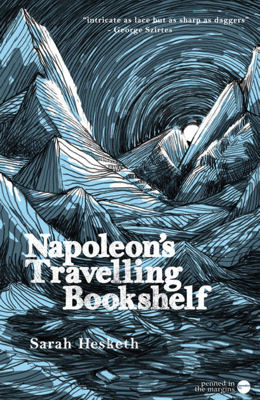
Napoleon's Travelling Bookshelf
by Sarah Hesketh
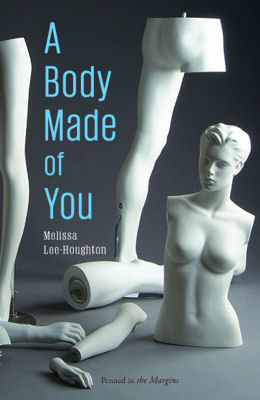
A Body Made of You
by Melissa Lee-Houghton
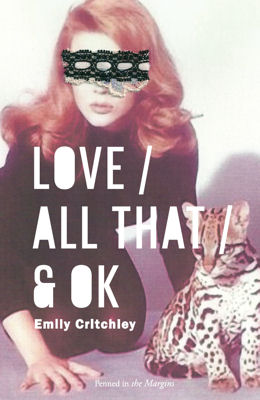
Love / All That / & OK
by Emily Critchley
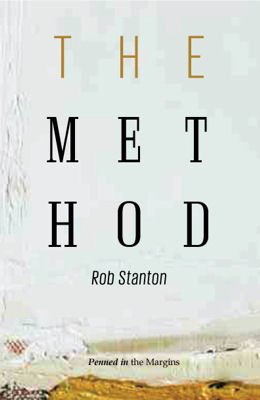
The Method
by Rob Stanton
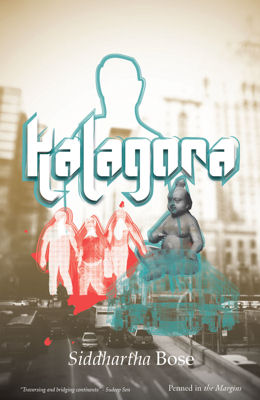
Kalagora
by Siddhartha Bose
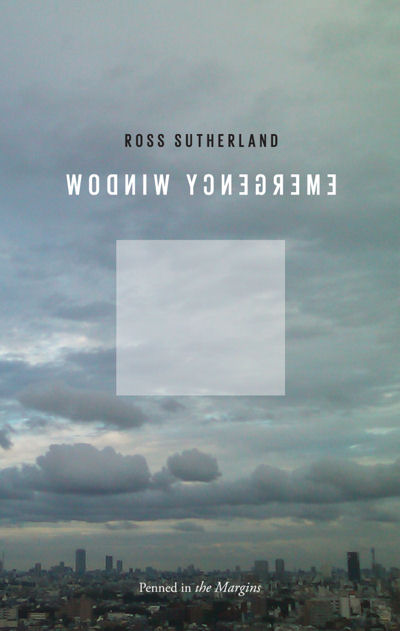
Emergency Window
by Ross Sutherland
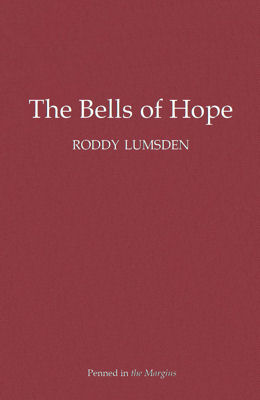
The Bells of Hope
by Roddy Lumsden
Border Control: A Penned in the Margins Round-Up
As well as publishing the innovative anthologies Adventures in Form (a Poetry Book Society special commendation) and Where Rockets Burn Through: Contemporary Science Fiction Poems from the UK (launched this month), London-based publisher Penned in the Margins has put out a glut of high quality debut collections over the past couple of years. Director/editor Tom Chivers has a penchant for London itself, the urban landscape and all it entails in the worlds of art and literature, but PitM books frequently travel far beyond this theme.
Sarah Hesketh’s Napoleon’s Travelling Bookshelf, for instance, is less concerned with cityscapes than with figures foraging in real and metaphysical cold – its historical portraits and anecdotes are the details on a broad, bleak canvas. The ‘Ravensbrück Seamstress’, from a poem of the same name, literally ‘bites buttons from the coats of dead men’, but many other characters cling to small objects or words, a ‘tinderbox of stories’ (‘Daughters of Elmet’) or ‘The butcher, clutching at a thighbone’ (‘The dissolution of the bones of St. Cuthbert’).
The tone is one of chilly tenderness. Wintry images lace the collection – glass, snow, bone, ‘the snappish intoxication of ice’ (‘Afternoons at Same Fusy’). ‘Chaconne for Ice’ is a sequence of very short poems inspired by Robert Francis’ photographs of snowflakes, and there’s a clue there, perhaps, to Hesketh’s approach to composition. She picks out the minutiae, building them into a kind of pattern or rhythm, making the bigger picture entirely out of these details and what they suggest, while tending to avoid a wide lens approach. At her best, she fields lines which are beautiful and brittle (‘my sister’s / fingers like a herd of horses / are retreating across the piano’) and crystal-sharp visions of lives defined by a mixture of desperation and hope, frailty and strength.
Sometimes, however, that commitment to detail leaves a poem struggling to add up. Opening lines ‘Remembering how Aristotle felt / metal-bound and hard to the throat’ are rendered infinitely more manageable by the notes explaining their context. Occasionally, other poems feel they would benefit similarly. I will always defend poetry’s right to be difficult, but sometimes, as here, the effect seems to run counter to what the poet is otherwise close to achieving. There are also various characters, all framed in similar moods of ghostly melancholy, that threaten to melt into one another.
Thankfully, there are also a well-judged handful of altogether more hot-blooded poems to lend variation to the atmosphere. ‘23 Kinds of Solitaire’s micro-portraits, for example, all have a mischievous air, while ‘The Funeral’ revels in implying an illicit liaison, ending with the tantalising image of ‘your shirt flaps spring, evasive and loose / in the dark dizzying fingers of the wind’.
Jude Cowan’s For The Messengers (Donut) made the case in 2011 for poetry-journalism as a hybrid-genre, and Melissa Lee-Houghton’s A Body Made of You does the same for – well, let’s call it poetry-sculpture. In each section of her debut collection, Lee-Houghton takes her subject (always a person, known to us only by their first name) and writes to and of them over one or multiple poems. But far from being mere portraiture, these pieces seek to capture a sense of the physicality of the person – their body, movement, scent, presence – in sound, texture and tone, even giving shape and character to their innards. Through consistently luminous imagery, Lee-Houghton fleshes out her muses, so that they can be both seen and seen through:
When you were happy, your tongue was soft in your mouth and
filled
your flesh, which gave gently around your ribcage and lungs. Your
breath
filled your whole body like a field of eucalyptus.
A kind of echolocation or sonar is employed here – often lengthy, the poems return again and again to the human body, building off its peculiar there-ness, its mixture of solidity and elasticity. At times, this has the effect of being unduly repetitive (‘breasts like small / milk pans filled with hot / milk” goes one poem, “if your breasts are not pert like upturned teacups / or filled with cub’s milk” goes the next) but more frequently, it leads to a unique and memorable engagement with the subject on multiple levels:
what a wedding band can do for the passage
of a girl who slips out of her knickers and into
her own despair, like there’s nothing there.
('Carbon')
There’s obviously a great deal of overt sexuality (as well as the multitude of breasts, bras and knickers, there’s tongues, lips, orgasms, the pubis and even ‘the complicated / ergonomics of the phallus’) but Lee-Houghton thankfully avoids (mostly) turning the pieces into musings on bedpost notches or unfulfilled desire. Likewise, there are frequent deviations into the subject’s history with the narrator, but not so much that the collection becomes a pillow book. It’s a difficult line to tread, and at times I felt like there was too much similarity between the various ‘characters’ for them to justify having their own sections, but it’s easy to forgive minor flaws in a book that strives so successfully to move beyond two-dimensional description and contains such a repository of memorable, nimble images.
I did struggle with the two Penned in the Margins books that come from the more experimental end of British poetry, but then such effort is to be expected when dealing with any work that is genuinely challenging.
On the subject of Emily Critchley’s Love / All That / & OK, I started to write a review in January of this year and had such a tormentous time trying to reach any conclusion that I was content to put my name to that it scared me off reviewing for many months. The book collects together work from a range of previously published chapbooks and adds in new material as well, although these are frequently framed as extracts from longer works. Critchley is a prolific poet whose various stylistic tics, though not unusual in experimental poetry, still have the potential to delight or annoy (ampersands in place of ‘and’s, tildas for hyphens, sudden changes of font size, a great deal of fragmentation and footnoting et cetera). I wrote one review that tried to trace her literary heritage and involved the construction of a graphic showing the web of connections in the world of the avant-garde. That didn’t get me anywhere. Jean Day and Denise Riley seem to be obvious influences, but beyond that, it’s not safe or fair to speculate.
Despite the opaqueness of the cover endorsements then (what on earth does Allen Fisher think he means by ‘The project is high electrics and considerable’ or ‘the frailty and edges of coherence loss’?) grappling with Critchley yields some pleasures. Her writing addresses love and gender politics with surprising directness, albeit mostly through misdirection, and though the book is couched as an ‘anti-confessional’, it strikes me as more of a kind of ironic examination of the confessional mode and its place in women’s poetry. You might find a certain warmth and charm in lines like these, taken out of context –
Love’s sweet brine disguised in a crab claw
nearly plucked the big secret out of me.
Now all the world’s like a long hard drive from Greenwich to Topeka
('Not home to myself this evening ...')
– but it arrives in the middle of a chain of self-conscious sonnets that lurch between misty-eyed romanticism and indie-cool cynicism. On the very next page:
O stayer~putter, slain champ
on the bright and verdant field
of love [….]
Jamie
shown it all to me last night
on a graph: first the buzz of the sexual feat,
then a slump here & there ~ well you get over it.
('O stayer~putter …')
This juxtaposition successfully disarms the preceding sensibility. Yup, romance is silly. In fact, Critchley repeatedly props up the characters of serious men and lovelorn women, only to undermine them with jarring tonal changes. But this skewering of convention is itself undermined when a poem like 'Honeymoon After Trikrit (i)' uses conventional repetition and internal rhyme to striking effect, teasing out tensions between feminism and lust:
Won’t you, when I’m an insufficient woman, point out the errors of my ways […]
Won’t you screw me on the rack & rack me on the plate & plate me to yr knife & knife me into afters?
Isn’t it a problem when a part of the book that leans, however subtly, towards more mainstream poetry techniques, and which has a kind of wild abandon, evokes the contradictions of love and politics most powerfully, while a piece titled 'The Triumph of Misogyny', for all its cleverness and control, descends into jeering?:
Then where will you be: you and yr long~dead poetry,
crying into yr textual apparatus ~ defunct apparatus ~ yr intended
interpretative activity. Huh.
Meanwhile, the extract from 'When I Say I Believe Women' has all the hallmarks of a straightforward sending up of gender determinism, with its notes in the margins and constantly prevaricating narrator, but 'Of All The Surprises: A Love Poem for Seaton' could be a genuine, mildly sentimental expression of emotion:
I long excessively
to scratch you again
& pull you close
And maybe it is. I’m not sure. That’s the problem with the ‘anti-lyric’; you can’t completely nix what is so appealing in simple, straightforward (if slightly weird) language, particularly when it relates to human weakness. It’s not surprising that lines like these stand out among much that is super-ironic (ironically ironic?). The same can be said for the line “I just want endless passion & the imprint of someone till I’m not a sex doll with a PhD”, in a poem that could be cut down to the final four lines without its impact being diminished.
So I find that I like Emily Critchley’s work but I like it most where it falls short of its mission to tear down and disrupt traditional modes of poetic exchange. What that says for the sharp politics of the book is beyond my powers of investigation.
Rob Stanton’s The Method at applies avant-garde techniques to good old-fashioned ekphrasis. The book is built around a mighty central tranche of sonnets based on the works of Luc Tuymans, a Belgian painter. Sometimes the descriptions would appear to be straightforward enough –
A warm painting
of something horrific. A product
of immense boredom. One shadow
seeps away
('14. Gaskamer, 1986')
– but more frequently, they are strange assemblages of little fragments from other types of texts. Note how, for instance, in the first few lines of ‘22. The Cry, 1989 & The Murderer, 1989’, Stanton welds together Facebook update, emergency instruction and forensic examination into something continuous:
Need a good cry. Or
to escape (down backstairs or
past glass, one solitary window-box a flash of
red & green): a number
of steps down, arms
held out at an angle, suspicious, blunt but
not without purpose …
Stanton is a collagist of tone and function. In one sense, he’s doing the old (though not so old to some) gathering up of our linguistic detritus and redeploying of it as something beguiling and beautiful. The poems in The Method rarely descend into meaning, or certainly not literal meaning; they are, like Lee-Houghton’s debut, exercises in sculpture, in this case abstract, minimalist sculpture. Words and phrases are included for their weight and flavour, rather than their sense. Lines are characteristically short and hard-edged (aside from the ‘odes’, which are set out as single paragraphs), and some are sorted into columns. When several of these two-column poems, with their one-word titles, are stacked up on top of each other, the effect is of a language broken apart, rather than spliced together.
The problem I found was that this is where my ability to mine the poetry stopped. I see the project as a whole, or the particular sequences, as carrying off interesting – sometimes unsettling – effects through their arrangement and clever juxtapositions, but individual pieces yielded little more. Stanton is an adroit judge and expert composer as far as his ambitions go, but I wish they went further.
Siddhartha Bose’s Kalagora is a successful tour as well as a book. On the page, the poems mirror the poet’s style of performance fairly well, spilling down the page in a waterfall of sound-play and fragmentary images, frequently alighting on smells, tastes and jagged details, the diction flexing to incorporate ghosts of accents, the vulgar and the refined. The poems revel in the urban environment both as adventure playground and crucible of lived experience, spanning multiple cities – Bombay, Calcutta, London – and Bose’s way of running on a sentence or reconfiguring its structure is a wonderful way of giving his work an off-kilter beat that's entirely in step with the mixed-up hurly-burly of city life:
Me you bleed on treetops that crown Siddhi-Vinayak,
pole-vaulting through cricket parks, churchbells,
lion in Sion.
Me you gorge in dark Bandra sounds,
with India electronica, the asli bhangra.
Me you lick in clamour bars of Juhu,
palm trees and pork by the sea-view.
('Animal City')
What surprises me, having seen Bose perform, is how many shorter poems are included, and how straightforward many of these are. His particular forte is the long poem, scripted to be performed with seemingly inexhaustible energy from memory, rumbling on like an underground train while odd snatches of bristlingly strange metaphor or alliteration snag on your ear. These poems inevitably risk testing the attention span, so it's a judicious step to break them up with brief but gorgeously worded sketches.
There’s also a degree of eroticism, though this bubbles up naturally from the sensuality of much of the language. It’s not a bold leap to move from –
Shiva, snaketongued father of mountain, came back in chariots of starlights
('Benares')
– to –
‘I gave head first in a Goa church,
flaked in coconuts. God never forgave.’
('Sketching (slight return)')
My one misgiving is that the relentlessness of the rhythmic clambering leads sometimes to a feeling of artificiality, particularly when Bose is recounting intimate or subtle scenes that seem to demand a more tranquil pacing.
Finally, to round off, Ross Sutherland has published four titles with PitM, one of which Irregular Features reviewed last year. His latest book, Emergency Window, is his strongest to date, although in part because it republishes choice selections from his preceding two shorter collections. Sutherland is a capable, exuberant performer and a humorist in the mould of Luke Kennard, but Emergency Window also incorporates thoughtful ‘collaborations’ that put existing texts through systems of translation and transformation. The results feel like pieces that have fought free of authorial control altogether and run amuck across the pages.
Roddy Lumsden’s The Bells of Hope couldn’t be more different. Published in handsome hardback, it takes the form of 51 poems in a measured, tightly controlled four-line form of Lumsden’s own invention. The titles are always ‘The [something]’ and run from A to Z and back to A. Although he’s pronounced these his most personal and revealing works to date, the poems seem more interested in accumulated sounds and images than confession. Each has the feel of something completely compressed, like a car crushed into a cube, except that somehow all the individual components have survived and are interlocking perfectly. Strange little machines, then, but working to somewhat secretive ends.









